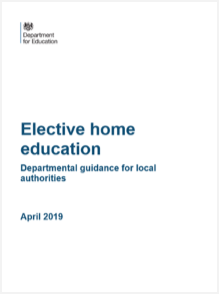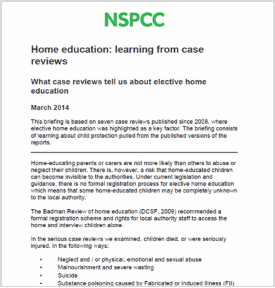Elective Home Education
Elective home education is a term used to describe a choice by parents to provide education for their children at home – or at home and in some other way which they choose – instead of sending them to school full-time.
Parents have a right to educate their children at home, and the government wants the many parents who do it well to be supported. They devote time, financial resources and dedication to the education of their children. Most parents who take up the weighty responsibility of home education do a great job, and many children benefit from being educated at home.
Educating a child (or children) full-time at home is a rewarding but challenging task. Parents may choose to engage private tutors or other adults to assist in providing a suitable education, but there is no requirement to do so. Although children being home-educated are not normally registered at any school, parents sometimes choose to make arrangements for a child to receive part of the total provision at a school – the purpose of this will often be to provide education in specific subjects more easily than is possible at home. Such arrangements are sometimes known as ‘flexi-schooling’.
Why do some parents choose to home education their child/ren?
There are many reasons why parents choose to educate children at home, including:
- Ideological or philosophical views which favour home education, or wishing to provide education which has a different basis to that normally found in schools
- Religious or cultural beliefs, and a wish to ensure that the child’s education is aligned with these
- Dissatisfaction with the school system, or the school(s) at which a place is available
- Bullying of the child at school
- Health reasons, particularly mental health of the child
- As a short term intervention for a particular reason
- A child’s unwillingness or inability to go to school, including school phobia
- Special educational needs, or a perceived lack of suitable provision in the school system for those needs
- Disputes with a school over the education, special needs or behaviour of the child, in some cases resulting in ‘off-rolling’1 or exclusion
- Familial reasons which have nothing to do with schools or education (eg using older children educated at home as carers)
- As a stop-gap whilst awaiting a place at a school other than the one allocated
Local authorities should bear in mind that whatever the reasons, in the majority of cases parents have undertaken home education in what they perceive as the best interests of the child even if they require additional support to undertake home education properly.
There are no specific legal requirements as to the content of home education, provided the parents are meeting their duty in s.7 of the Education Act 1996 (The parent of every child of compulsory school age shall cause him to receive efficient full-time education). This means that education does not need to include any particular subjects, and does not need to have any reference to the National Curriculum; and there is no requirement to enter children for public examinations.
Safeguarding and the Interface with Home Education
A situation in which a child is not receiving a suitable full-time education (as per s.7 of the Education Act 1996) requires action by a local authority under education law. But it is important to bear in mind that unsuitable or inadequate education can also impair a child’s intellectual, emotional, social or behavioural development, and may therefore bring child protection duties into play. This will depend on the facts of the case, but local authorities should consider whether they ought to take action under safeguarding law, especially where the steps described above have not been, or seem unlikely to be, sufficient to address a risk to a child’s welfare. A failure to provide suitable education is capable of satisfying the threshold requirement contained in s.31 of the Children Act 1989 that the child is suffering or is likely to suffer significant harm.
Sections 10 and 11 of the Children Act 2004 give local authorities general duties for promoting the well-being and (in relation to their non-education functions) safeguarding and promoting the welfare of children in their areas. This includes children educated at home as well as those attending school. Section 175 of the Education Act 2002 requires authorities to make arrangements for ensuring that their education functions are exercised with a view to safeguarding and promoting children’s welfare. Therefore the general duties of local authorities in relation to safeguarding are the same for all children, however they are educated.
There is no proven correlation between home education and safeguarding risk. In some serious cases of neglect or abuse in recent years, the child concerned has been home educated but that has not usually been a causative factor and the child has normally been known anyway to the relevant local authority. However, a child being educated at home is not necessarily being seen on a regular basis by professionals such as teachers and this logically increases the chances that any parents who set out to use home education to avoid independent oversight may be more successful by doing so. Several recent Serious Case Reviews have illustrated this. However, safeguarding is not simply a matter which arises in relation to the family. Some parents who educate at home believe that by doing so, they are safeguarding the child from risk in the school system (eg through serious bullying).
Local authorities should approach all cases where the suitability of home education is in doubt using their powers in the Education Act 1996, but they should also be ready, if a lack of suitable education appears likely to impair a child’s development, to fully exercise their safeguarding powers and duties to protect the child’s well-being, which includes their suitable education. Whether the provision of unsuitable education does amount to significant harm must always depend on the particular circumstances of the child, and whether those circumstances mean that the child’s intellectual and social development are being, or are likely to be, significantly impaired. To determine this the Local Authority will usually be an investigation under s.47 of the 1989 Act, which requires an authority to make enquiries to enable it to decide whether action should be taken to protect the child’s welfare, if it has reasonable cause to suspect that the ‘significant harm’ threshold is met.
Useful National Links
Department for Education Elective Home Education Guidance
Elective Home Education Learning from Serious Case Reviews
a
Useful Local Links
Wirral Council School Admissions:
https://www.wirral.gov.uk/schools-and-learning/school-admissions
Wirral Council School Holidays and Term Dates:
https://www.wirral.gov.uk/schools-and-learning/school-holidays-and-term-dates
Wirral Council Special Educational Needs and Disabilities:
https://www.wirral.gov.uk/schools-and-learning/special-educational-needs-and-disability
Wirral Council Education Attendance Service:
https://www.wirral.gov.uk/schools-and-learning/education-social-welfare-service


